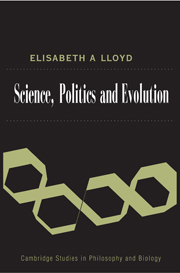Book contents
- Frontmatter
- Contents
- 1 The Nature of Darwin's Support for the Theory of Natural Selection
- 2 A Semantic Approach to the Structure of Population Genetics
- 3 Confirmation of Ecological and Evolutionary Models
- 4 Units and Levels of Selection
- 5 Species Selections on Variability
- 6 An Open Letter to Elliott Sober and David Sloan Wilson, Regarding Their Book, Unto Others: The Evolution and Psychology of Unselfish Behavior
- 7 Problems with Pluralism
- 8 Normality and Variation: The Human Genome Project and the Ideal Human Type
- 9 Evolutionary Psychology: The Burdens of Proof
- 10 Objectivity and the Double Standard for Feminist Epistemologies
- 11 Science and Anti-Science: Objectivity and Its Real Enemies
- 12 Pre-Theoretical Assumptions in Evolutionary Explanations of Female Sexuality
- References
- Index
10 - Objectivity and the Double Standard for Feminist Epistemologies
Published online by Cambridge University Press: 27 February 2010
- Frontmatter
- Contents
- 1 The Nature of Darwin's Support for the Theory of Natural Selection
- 2 A Semantic Approach to the Structure of Population Genetics
- 3 Confirmation of Ecological and Evolutionary Models
- 4 Units and Levels of Selection
- 5 Species Selections on Variability
- 6 An Open Letter to Elliott Sober and David Sloan Wilson, Regarding Their Book, Unto Others: The Evolution and Psychology of Unselfish Behavior
- 7 Problems with Pluralism
- 8 Normality and Variation: The Human Genome Project and the Ideal Human Type
- 9 Evolutionary Psychology: The Burdens of Proof
- 10 Objectivity and the Double Standard for Feminist Epistemologies
- 11 Science and Anti-Science: Objectivity and Its Real Enemies
- 12 Pre-Theoretical Assumptions in Evolutionary Explanations of Female Sexuality
- References
- Index
Summary
On the face of it, feminism, as a political movement or ideology, is irrelevant to truth. Therefore, it is irrelevant to objectivity, which is about truth and how to get at it.
I believe that philosophical and scientific views regarding “objectivity” are the source of the fiercest and most powerful intellectual and rhetorical weapons deployed against feminist critiques of epistemology and of the sciences. This is because philosophy of science and epistemology are, after all, concerned with analyzing cases of good reasoning. The philosophical challenges are to formulate and examine: how good scientific knowledge is produced; how and whether other forms of knowledge (e.g., moral knowledge) differ from scientific knowledge; and how to explain why science seems to be such a successful way to produce knowledge. The concepts of truth, objectivity, and evidence are at the heart of these investigations, and rightly so, I believe.
Many philosophers acknowledge – under the pressure of overwhelming evidence – that sex and gender issues may play roles in the social sciences, but never in the mathematical or natural sciences. The fact is that detailed arguments from within the scientific community about the influence of sex and gender issues in the natural and mathematical sciences have been around for more than a decade. Yet this evidence has been largely ignored. Instead, many philosophers assume that there is no evidence – and could not be such evidence – to support feminist analyses of the importance of sex and gender in every branch of knowledge.
- Type
- Chapter
- Information
- Science, Politics, and Evolution , pp. 170 - 201Publisher: Cambridge University PressPrint publication year: 2008

